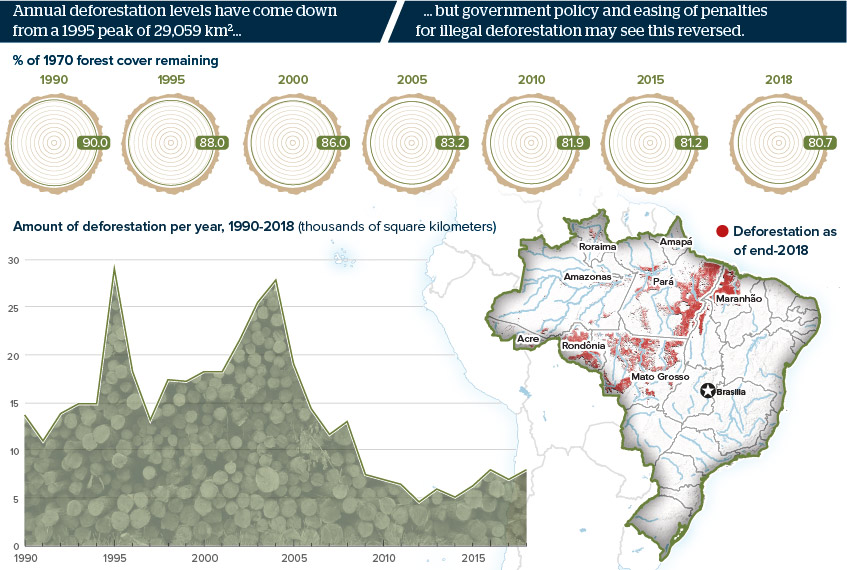Agribusiness focus risks rise in Brazil deforestation
EU hopes that a Mercosur-EU trade deal could increase leverage over Brazil’s environmental policy may prove wrong
Source: Brazilian National Institute for Space Research (INPE); UN Food and Agriculture Organization (FAO)
Outlook
Forest cover in Brazil’s Amazonia reached some 4.1 million square kilometres (km2) in 1970. By 2018 that figure had been reduced to around 3.3 million km2 -- down nearly 20% in less than 50 years.
Although annual deforestation rates fell to four-digit figures in the past decade, monthly figures since President Jair Bolsonaro took office show new sharp rises: according to INPE, year-on-year rates rose by 34% in May, 88% in June and 68% in the first half of July alone compared to the full month in 2018.
Bolsonaro has accused INPE of lying, saying that Brazil suffers from “environmental psychosis” and telling a European journalist that “the Amazon is ours, not yours”. Yet international pushback could scupper expanded farm exports under the Mercosur-EU free trade.
Impacts
- Norway -- the main contributor to the Amazon Fund -- has expressed alarm and the possibility that the fund could be terminated.
- The environmental impact of forest clearing to expand agriculture may bolster European farmers seeking to block Mercosur farm imports.
- French President Emmanuel Macron’s hope that the trade deal would prevent Bolsonaro from reneging on climate commitments may be dashed.
- The new government’s easing of restrictions and penalties relating to deforestation will encourage more mining, logging and agribusiness.
See also
- Latin America faces an increase in climate mobility - Aug 9
- Amazon rainforest faces existential climate risk - Mar 22
- Brazil's environmental policy faces political hurdles - Sep 18, 2023
- Climate litigation is set to grow globally - Jan 27, 2023
- Brazil deforestation pressures will mount at COP26 - Oct 29, 2021
- New Brazilian environmental promises clash with policy - May 6, 2021
- Global and Brazilian Amazon pressures will rise - Sep 14, 2020
- Pandemic will weigh on green bond issuance this year - Aug 24, 2020
- Environmental activist killings look set to worsen - Aug 11, 2020
- Brazil's agriculture outlook faces challenges in 2020 - Mar 11, 2020
- Aggressive Brazilian foreign policy risks isolation - Sep 19, 2019
- Environmental policies will damage Brazil's trade - Aug 22, 2019
- States will seek to revive Brazil's Amazon Fund - Aug 20, 2019
- Brazil deforestation debate targets data not action - Aug 6, 2019
- Brazil deforestation will mount amid data censorship - Aug 5, 2019
- Mercosur-EU trade deal will face wide opposition - Jul 9, 2019
- More graphic analysis
